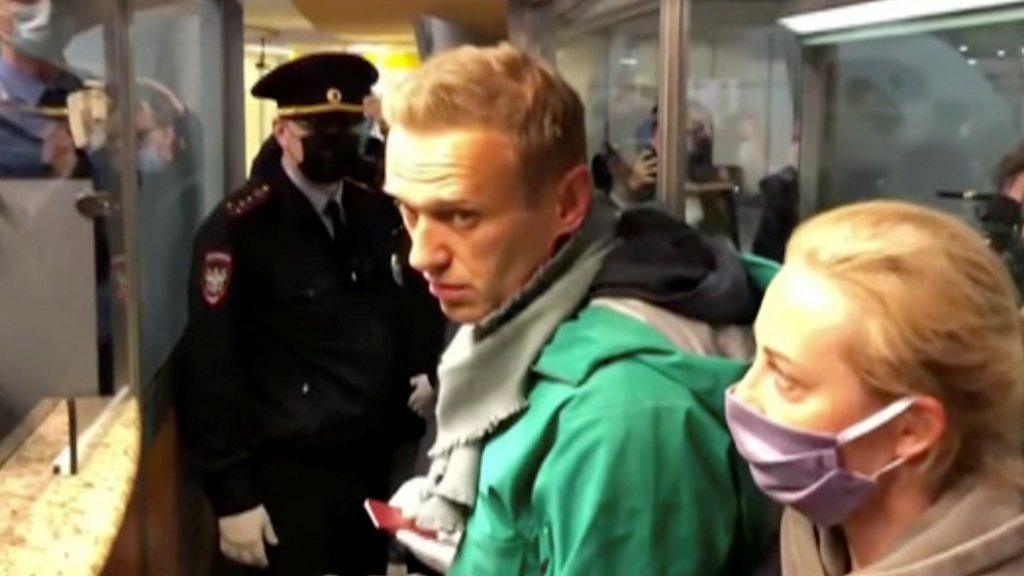Alexei Navalny: Millions watch jailed critic's 'Putin palace' film
- Published
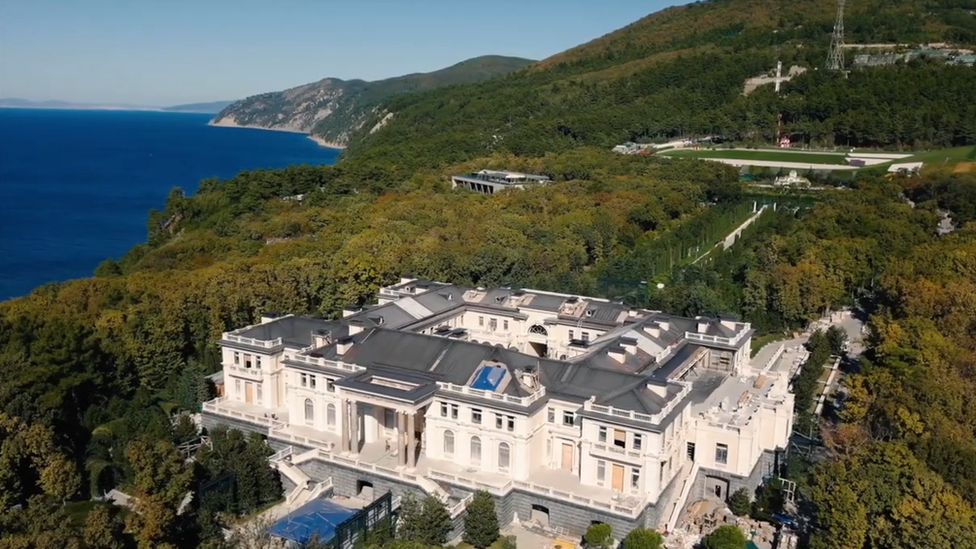
The report claims the vast property features a casino, an ice rink and a vineyard
A video investigation by Russia's leading opposition figure that claims President Vladimir Putin spent illicit funds on an extravagant Black Sea palace has reached more than 20 million people within a day of publication.
Alexei Navalny's team released it after he was jailed on his return to Moscow.
The investigation alleges the property cost £1bn ($1.37bn) and was paid for "with the largest bribe in history".
The Kremlin denies the property belongs to the president.
Claims that federal officials were guarding a vast palace complex on the Black Sea coast were "pure nonsense", spokesman Dmitry Peskov said.
The Navalny investigation describes the property as 39 times the size of Monaco.
The report was released on Tuesday, two days after Mr Navalny flew back from Germany and was arrested at the airport.
He was placed in pre-trial detention for 30 days on Monday on a charge of violating probation terms for a suspended sentence for embezzlement that he maintains is politically motivated. A separate case against him was due to start on Wednesday but was postponed.
The 44-year-old was almost killed in a nerve agent attack last August, which he blamed personally on Mr Putin. The Kremlin denies involvement.
The opposition politician's allegations of security service involvement have, however, been backed up by reports from investigative journalists.
What does the investigation say?
The report claims the property in the resort town of Gelendzhik was constructed using illicit funds provided by members of Mr Putin's inner circle, including oil chiefs and billionaires.
"[They] built a palace for their boss with this money," Mr Navalny says in the video.
It alleges that Russia's Federal Security Service (FSB) owns some 27 sq miles (70 sq km) of land surrounding the private residence.
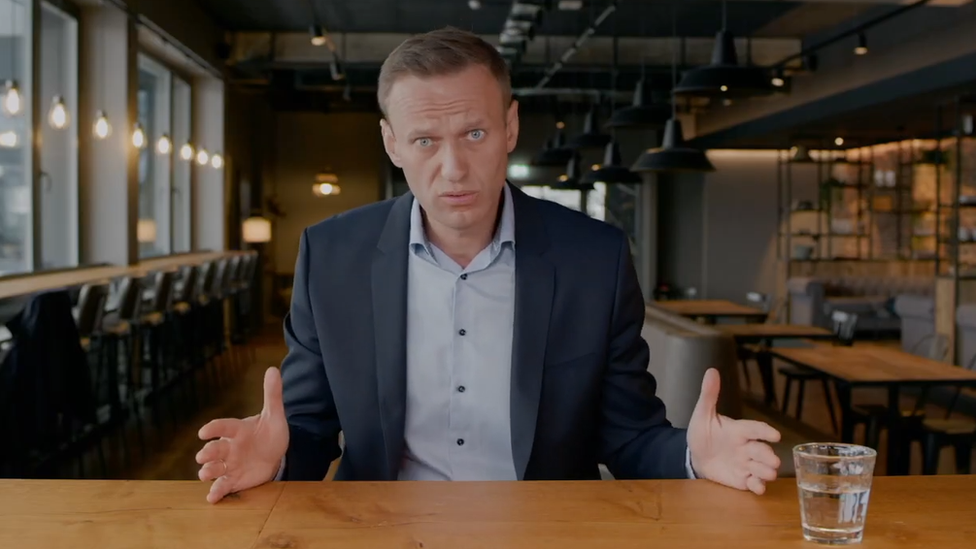
The video was viewed more than 20 million times within a day of its release
The report describes various details of the property, and claims it features a casino, an underground ice hockey complex and a vineyard.
"It has impregnable fences, its own port, its own security, a church, its own permit system, a no-fly zone, and even its own border checkpoint," Mr Navalny says in the video.
"It is a separate state within Russia," he adds. "And in this state there is a single, irreplaceable tsar. Putin."

Alexei Navalny - The basics
Mr Navalny is an anti-corruption campaigner and the most prominent face of Russian opposition to President Vladimir Putin
He attempted to stand in the 2018 presidential race, but was barred because of an embezzlement conviction that he says was politically motivated
An outspoken blogger, he has millions of Russian followers on social media and managed to get some supporters elected to local councils in Siberia in 2020

Mr Peskov told state news agency RIA Novosti on Tuesday that claims made in the report were "untrue" and that the president "doesn't own palaces".
He went further on Wednesday, insisting that the president declared all his property annually. "These are all absolutely unfounded claims," he said. "This is pure nonsense and... there's nothing else in it."
The video report was released on Tuesday, external and, within little over 24 hours, it had already been viewed more than 22 million times.
It ends with a plea for people to take to the streets. "If 10% of those who are disaffected take to the streets, the government will not dare falsify elections," Mr Navalny says.

Navalny raises the stakes - again

Alexei Navalny had already raised the stakes by returning to Russia. It was a direct challenge to President Putin: the man he accuses of ordering his poisoning.
So it came as no surprise when he was detained at the airport and remanded in custody for 30 days.
But it seems that from his cell, Russia's most high-profile opposition figure still has the power to embarrass the Kremlin. Within hours his investigation into "Putin's Palace" had notched up millions of views.
Mr Navalny's supporters have called for protests this weekend to demand his release. Will images of an opulent palace and new accusations of corruption bring more people onto the streets?
That's unclear. One thing, however, is certain: Mr Navalny has achieved something that seemed impossible just a day ago. In his confrontation with the authorities, he's raised the stakes even higher.

What's next for Alexei Navalny?
On 2 February, a court will consider whether a suspended sentence of three-and-a-half years that Mr Navalny received in 2014 on fraud charges should be converted into a jail term.
Three days later, he will face another court appearance, on a charge of libelling a World War Two veteran.
He is being held at the Matrosskaya Tishina prison in Moscow, after a judge ordered his detention until 15 February for violating the terms of his suspended fraud sentence. Instead of reporting regularly to the prison service, he was recuperating in Germany from the nerve agent attack.
Alexei Navalny was filmed by the BBC saying goodbye to his wife and then being led away by authorities
A makeshift courtroom was organised on Monday at a police station in Khimki, on the outskirts of Moscow, where Mr Navalny had spent the night.
He travelled to Russia from Germany - where he had been receiving medical treatment since August - despite warnings he would be arrested on arrival.
Mr Navalny said his legal treatment was beyond a "mockery of justice" and described Monday's hearing as "lawlessness of the highest grade".
His lawyers have said they are planning to appeal against the "illegal" court decision, according to Russia's Interfax news agency.
There are also questions over whether his detention contravenes a 2018 decision by Europe's top human rights court, which found the fraud charges against Mr Navalny were "arbitrary".
Related topics
- Published19 January 2021
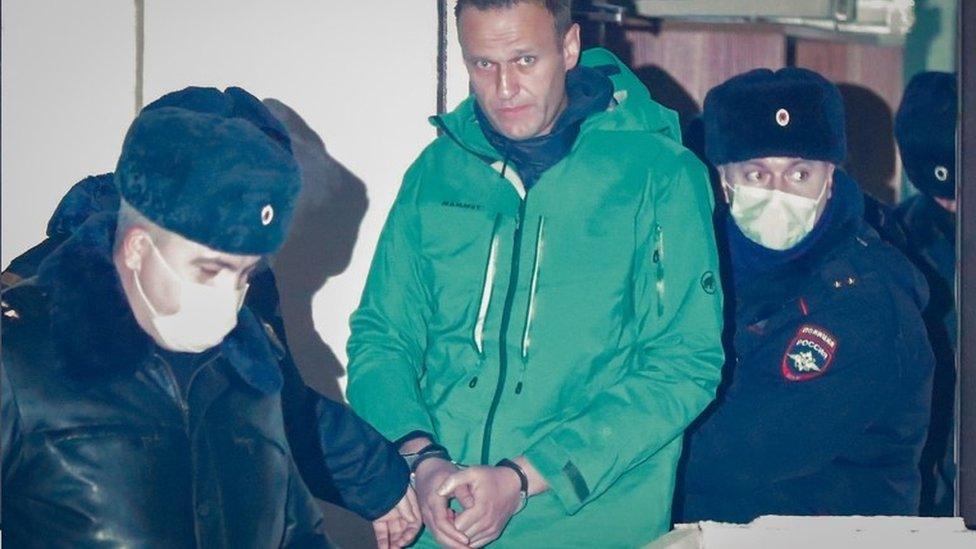
- Published14 December 2020
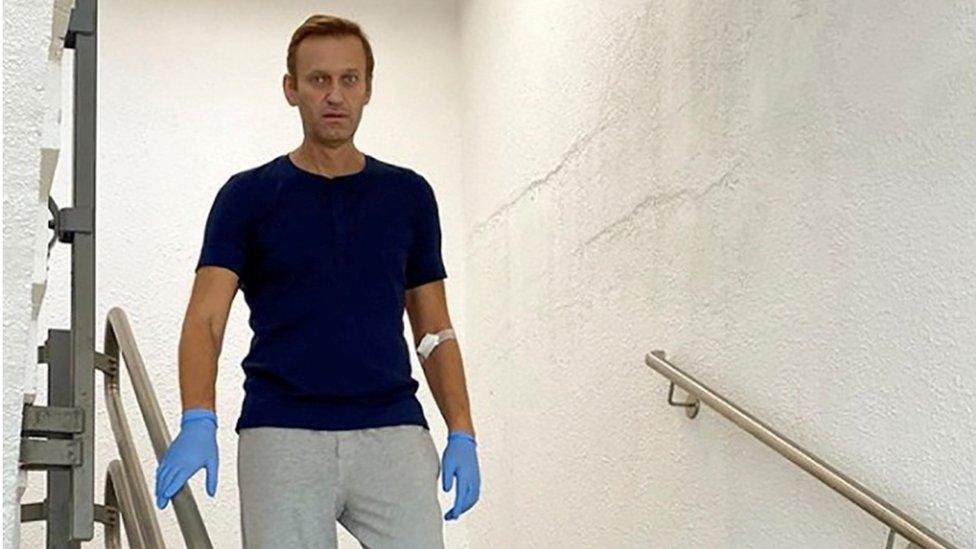
- Published18 January 2021
